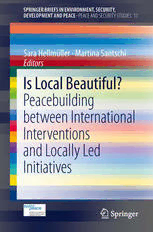Table Of ContentSPRINGER BRIEFS IN ENVIRONMENT, SECURITY,
DEVELOPMENT AND PEACE PEACE AND SECURITY STUDIES 11
Sara Hellmüller · Martina Santschi
Editors
Is Local Beautiful?
Peacebuilding
between International
Interventions
and Locally Led
Initiatives
SpringerBriefs in Environment, Security,
Development and Peace
Peace and Security Studies
Volume 11
Series editor
Hans Günter Brauch
For furthervolumes:
http://www.springer.com/series/13034
http://www.afes-press-books.de/html/SpringerBriefs_ESDP_MiS.htm
Sara Hellmüller Martina Santschi
•
Editors
Is Local Beautiful?
Peacebuilding between International
Interventions and Locally Led Initiatives
123
Editors
SaraHellmüller
Martina Santschi
swisspeace
Bern
Switzerland
ThecoverphotowastakenatDinkaMalwal,Misseriyapeaceconferencein2008,SouthSudan,
whereaMisseriyaandDinkaparticipantdancetogether.ThephotographwastakenbyMartina
Santschi/swisspeacewhograntedpermissiontousethisphoto.
ISSN 2193-3162 ISSN 2193-3170 (electronic)
ISBN 978-3-319-00305-4 ISBN 978-3-319-00306-1 (eBook)
DOI 10.1007/978-3-319-00306-1
SpringerChamHeidelbergNewYorkDordrechtLondon
LibraryofCongressControlNumber:2013954771
(cid:2)TheAuthor(s)2014
Thisworkissubjecttocopyright.AllrightsarereservedbythePublisher,whetherthewholeorpartof
the material is concerned, specifically the rights of translation, reprinting, reuse of illustrations,
recitation,broadcasting,reproductiononmicrofilmsorinanyotherphysicalway,andtransmissionor
informationstorageandretrieval,electronicadaptation,computersoftware,orbysimilarordissimilar
methodology now known or hereafter developed. Exempted from this legal reservation are brief
excerpts in connection with reviews or scholarly analysis or material supplied specifically for the
purposeofbeingenteredandexecutedonacomputersystem,forexclusiveusebythepurchaserofthe
work. Duplication of this publication or parts thereof is permitted only under the provisions of
theCopyright Law of the Publisher’s location, in its current version, and permission for use must
always be obtained from Springer. Permissions for use may be obtained through RightsLink at the
CopyrightClearanceCenter.ViolationsareliabletoprosecutionundertherespectiveCopyrightLaw.
The use of general descriptive names, registered names, trademarks, service marks, etc. in this
publicationdoesnotimply,evenintheabsenceofaspecificstatement,thatsuchnamesareexempt
fromtherelevantprotectivelawsandregulationsandthereforefreeforgeneraluse.
While the advice and information in this book are believed to be true and accurate at the date of
publication,neithertheauthorsnortheeditorsnorthepublishercanacceptanylegalresponsibilityfor
anyerrorsoromissionsthatmaybemade.Thepublishermakesnowarranty,expressorimplied,with
respecttothematerialcontainedherein.
Printedonacid-freepaper
SpringerispartofSpringerScience+BusinessMedia(www.springer.com)
Foreword
KwameNkrumah,formerpresidentofGhana,recognizedtheneedforsometypeof
Africanregionalsecurityarrangementasearlyasthe1960s.Eversince,sloganslike
‘AfricansolutionsforAfricanproblems’hit,breakingwavesalike,theshoresofthe
development assistance and peacebuilding fields. Their message was simple and
crystal clear: local people know best what their problems are and therefore also
know best what the appropriate solutions would be. During the past decades, the
concept of local ownership—or sometimes even local leadership—which hides
behind ‘African solutions for African problems’ has become a political mantra,
both in development assistance and in peacebuilding. Since it seems to reflect
nothingbutcommonsense,onecannotevenquestionthisnotionwithouttheriskof
beingaccusedofpursuingneo-colonialistambitionsandofdisplayingagooddeal
ofWesternarrogance.Hence,thequestionIsLocalBeautiful?,thetitleofthe2012
swisspeaceannualconference,maysoundstrangetotheearsofmanypractitioners
inthe field and,asked with a twinkle in the eye, even sound sacrilegious.
Local ownership was the somehow unavoidable answer to the formerly stan-
dardpracticethatdevelopmentandpeacebuildinginitiativesoriginatedinwestern
capitals and were conceived by western experts who all too often had little
knowledge of the specificities of the societies and states in which they targeted
their programmes. For years now, fierce debates have been raging between the
‘proponentsofliberalpeace’andthe‘communitarians’.Theformerareconvinced
that existing universal norms orbiting around certain political and economic
principles of good governance are the gold standard of peacebuilding and should
befollowedatalltimesandinallplaces.Thelatter,instead,insistthatratherthan
relying on a universal template, sustained solutions to the problems of political
orderandgoodgovernancemustoriginatewithinthesocietiesthemselvesandtake
into account country-specific traditions.
Thebattlebetweenthosetwoschoolsofthoughthasnotresultedinaone-sided
victory—and most probably never will. While there is ample evidence that the
daysoftraditionalpeacebuildingwithitstool-boxandone-size-fits-allapproaches
arenumbered,expertsincreasinglyagree thatviablepeacebuildingsolutionsneed
tobemorepragmatic.Insteadoftakingeitheralocaloraninternationalstancein
v
vi Foreword
assessing peacebuilding priorities and activities, a middle ground is needed with
greater focus on plurality and a careful assessment of each actor’s comparative
advantages (see Hellmüller, this volume).
This book grew out of the proceedings of the swisspeace annual conference
2012.Itsconceptualcontributionsdiscussthewideplethoraofchallengesoflocal
ownership and suggest alternative concepts, such as political ownership, inclu-
siveness, honesty and partnerships. The case studies, in turn, illustrate the many
successes of peace initiativeswhich were at various degrees locally led or locally
driven. At the same time, however, they also allude to the problems which arise
when it comes to putting the widely accepted local ownership paradigm into
practice.Amongthedifficultieswhichweencounteroverandoveragain,Iwould
like to highlight just two:
First, societies in conflict affected or conflict prone regions are by no way
homogeneous entities. In reality they are deeply divided into different interest
groups and speak with different voices. But whose voices should be heard and
prioritized among the cacophony of local owners? Don’t we tend to favor the
voices ofgroups andindividualstowhomwe findeasy access becausethey share
our political beliefs and cultural norms and, most of all, speak our languages?
Second,theconceptoflocalownershiptendstoassumenotonlythatthereisa
minimum of social cohesion and commonality of purpose amongst local actors,
but also that local owners possess the capacity and the will to pool their efforts
towards the creation of a just and stable political order. In reality, though, we
regularly have to realize that those capacities and capabilities, as well as the
political will to build lasting peace, are rather limited.
Ever since swisspeace helped to build up the Afghan Civil Society Forum in
Kabul between 2001 and 2005, we have been aware of the manifold difficulties
which are entwined with the concept of local ownership. We knew from the
beginningofthisworkthattryingtoimposeawestern-stylepoliticalsystemupon
Afghanistanwasinevitablydoomedtofailureandthereforewedecidedtoexamine
alternativewaystobringpeaceandstabilitytothecountry.Inanattempttostrike
the difficult balance between external intervention and strengthening local
capacities,wehelpedtocreatetheTribalLiaisonOffice,thusofferingaseattothe
tribal elders at the negotiating table and providing an opportunity totap intotheir
unique knowledge and make use of their political sensitivity.
Based on this particular experience and similar endeavors in Africa, we are
convinced that, in order to be successful, peacebuilding requires that all available
resources are mobilized—local and international, governmental and civil society
actors, business and non-profit enterprises alike. An entrepreneurial combination
of external intervention and local efforts is needed, with concerted attention from
the outset to finding, growing, and nurturing local capacities.
Whatcountsintheendistodotherightthingsattherighttimeandtoempower
capacitiesforpeace,wherevertheyarefound.Atthesametime,itisnecessaryto
Foreword vii
dismantlestructuresthathinderprogresstowardbuildingafunctioningstatewhich
abides by the rule of law and puts in place the mechanisms needed to cope with
conflictinaconstructive,nonviolentmanner.Thechaptersinthisbookconfirmthe
validityofourarguments.Atthesametimetheyalsoremindustobemodestand
humble about what can and cannot be achieved within the inevitably complex,
politically volatile, and dynamic contexts of any peacebuilding effort.
Bern, swisspeace, July 2013 Dr. Heinz Krummenacher
Acknowledgments
TheeditorswouldliketothanktheSwiss Academy ofHumanitiesandSocialSci-
ences(SAGW)andtheSupportAssociationofswisspeaceforprovidinggenerous
fundingfortheswisspeaceannualconference,Dr.BrionyJonesforproof-readingthe
articlesandDr.HansGünterBrauch,theESDPserieseditor,andtheSpringerteams
inHeidelberg(Germany)andChennai(India)forpublishingthisvolume.
swisspeace annual conference 2012, Bern. Source swisspeace. Permission to use
this photo was granted.
swisspeace annual conference 2012, Bern. Source swisspeace. Permission to use
this photo was granted.
ix
x Acknowledgments
swisspeace annual conference 2012, Bern. Source swisspeace. Permission to use
this photo was granted.
swisspeace annual conference 2012, Bern. Source swisspeace. Permission to use
this photo was granted.
Acknowledgments xi
swisspeace annual conference 2012, Bern. Source swisspeace. Permission to use
this photo was granted.

